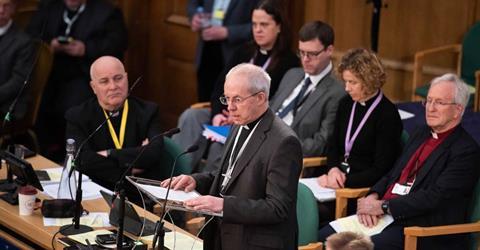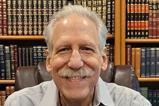Following the furore caused by the CofE’s decision to disband the Independent Safeguarding Board (ISB) this summer, a review into what went wrong has now been published. But until the Church accepts that it has lost the trust of survivors and victims, there can be no moving forward, says Gavin Drake

Lewis Carroll is well-known for many things. To his literary prowess, mathematical mind and artistic bent can now be added a new accolade: the style-guide writer for the Church of England’s safeguarding fiasco.
I use the term “safeguarding fiasco” because I, like many others, no longer know where responsibility lies for various safeguarding functions of the Church: the National Safeguarding Team, the National Safeguarding Panel, the National Safeguarding Steering Group, the Archbishops’ Council trustees, the Archbishops’ Council’s staff, the lead and deputy lead bishops for safeguarding, and on, and on, and on.
“‘When I use a word,’ Humpty Dumpty said in rather a scornful tone, ‘it means just what I choose it to mean - neither more nor less.’
‘The question is,’ said Alice, ‘whether you can make words mean so many different things.’”
This exchange from Carroll’s Through the Looking Glass: And what Alice found there (Macmillan) rings in my ear whenever I read anything the CofE has to say about safeguarding.
Where the fault lies
In its press release this week, which announced the publication of Sarah Wilkinson’s review of the Independent Safeguarding Board (ISB) the CofE said: “The report is clear that the breakdown in relationships between the ISB members following the appointment of the acting Chair – which was evident at the Archbishops’ Council’s meeting on May 9, 2023 – was the event which made termination of their contracts almost inevitable.”
Does the Archbishops’ Council really still believe that victims and survivors trust them to deliver safeguarding?
The Wilkinson Review does indeed make this clear (see paragraph 656 of the report) but in the context of the CofE press statement, it implies that the actions of the ISB members, including Steve Reeves and Jasvinder Sanghera CBE, led to the collapse of the ISB. It leads to the view that the ISB members are at fault, rather than the Archbishops’ Council.
But that is not what the Wilkinson Review says. The immediately preceding paragraph says this: “In my view, the appointment of the acting Chair without consulting the other ISB members by the Archbishops’ Council was the most significant short term cause of the termination of the ISB contracts.”
Misleading statements
The review also highlighted a number of misleading or incorrect statements, including a report made to General Synod in July 2022 which stated that an information sharing agreement between the ISB and the National Church Institutions had been signed; the Chair of the Audit Committee telling Synod that the committee “did not have the power to conduct an audit” of the ISB’s operation in February 2023; and an “inaccurate” statement by a “Church House source” to The Church Times in July 2023, stating that efforts had been made to contact individuals before the termination of the ISB members’ contracts.
Most seriously, it emerged that a spokesperson for the Archbishops’ Council briefed the media that: “the Archbishops supported the unanimous decision to terminate the contracts of the Independent Safeguarding Board members”, which resulted in Most Rev Justin Welby, Archbishop of Canterbury, being erroneously accused of lying to the General Synod.
But here we are back to Archbishops’ Council safeguarding double-speak, where words mean what they want them to mean. For while the spokesperson speaks of a “unanimous decision”, the Wilkinson Review reveals that the vote to terminate the ISB contracts was carried by eleven votes to four, and that another four members abstained. “Some members of the Council, including the Archbishops, wished to wait and not to proceed to an immediate termination”, Sarah Wilkinson said.
Ending the double-speak
Victims and survivors of church-related abuse, and those who advocate for them, are used to double-speak from the CofE. But an inability to speak the truth, plainly and simply, adds to the trauma that so many people are already experiencing. So does the continual insistence by the Archbishops’ Council that they will “learn the lessons” of their mistakes, a claim that is repeated in this week’s press release.
The fiasco that currently surrounds safeguarding in the CofE stems from not learning from its mistakes. It has even given up the pretense, changing the name of Lessons Learned Review to the Safeguarding Practice Review.
When I was a member of the General Synod, I repeatedly asked the Archbishops’ Council to publish a list of recommendations from the Lessons Learned Review, alongside information showing progress on implementation. The answer was always that it was “too difficult” to do so. It is one of the reasons that I eventually resigned.
I, like many others, do not know where responsibility lies for safeguarding functions in the CofE
One of the most brazen examples of Humpty Dumpty-esque double-speak from the Archbishops’ Council can be found in their press release reference to “the survivors and victims of abuse – and, more widely, all those who come in contact with the Church and who place their trust in us to deliver the highest standards of safeguarding”.
Does the Archbishops’ Council really still believe that victims and survivors trust them to deliver safeguarding? Has it not been listening to them over the past several years? The Wilkinson Review has not been published in a vacuum. They are still awaiting Professor Alexis Jay’s proposals for a fully independent structure to provide scrutiny of safeguarding. Have they forgotten why such structures are needed?
If the Church of England wants to begin restoring the trust of victims, survivors and their advocates, they can start by ending the double-speak and let words mean not what the Archbishops’ Council want them to mean, but what ordinary people understand them to mean.






































4 Readers' comments